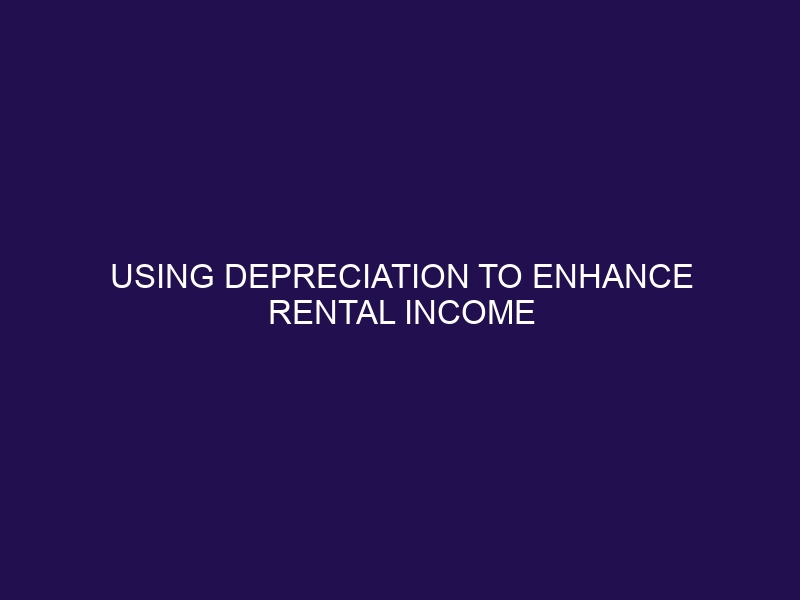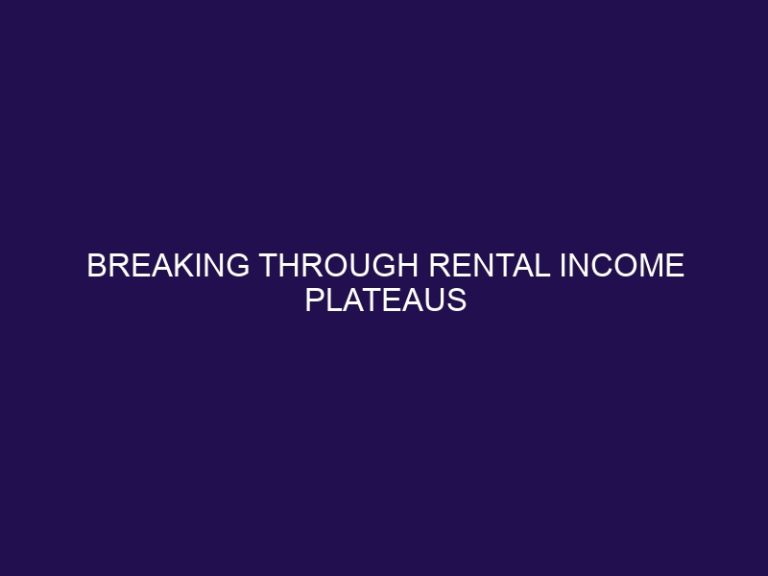Using Depreciation to Enhance Rental Income
Depreciation is the gradual decrease in the value of an asset over time due to wear and tear, obsolescence, or other factors. In the context of rental properties, it refers to the decrease in the value of the building and its furnishings over time. This decrease in value can have significant benefits for rental property owners, making it an essential concept for them to understand.
In rental properties, depreciation works by allowing owners to deduct a portion of the property’s value as an expense against their rental income. This deduction reduces their taxable income and can result in significant tax savings. According to a study by the National Association of Realtors, depreciation can account for up to 27% of a rental property’s annual income.
It is essential to note that there is a difference between depreciation and amortization. While both refer to the decrease in value of an asset over time, depreciation is specific to tangible assets such as buildings, furniture, and equipment, while amortization is used for intangible assets such as patents and copyrights.
So, what are the benefits of depreciation for rental property owners? Let’s explore:
- Reduces Tax Liability: Depreciation allows owners to deduct a portion of their property’s value as an expense, reducing their taxable income and overall tax liability.
- Increases Cash Flow: By lowering tax liability, depreciation can increase cash flow for rental property owners, improving their profitability.
- Allows for Property Upgrades: The savings from depreciation can be used to upgrade and improve the property, making it more attractive to potential tenants and increasing rental income.
To calculate depreciation for rental properties, there are a few steps to follow:
- Determine the Property’s Basis: This includes the purchase price, closing costs, and any other expenses related to acquiring the property.
- Determine the Property’s Useful Life: The IRS has set guidelines for the expected useful life of different types of rental property, and this will determine the number of years over which depreciation can be claimed.
- Calculate Annual Depreciation: This can be done using various methods, such as the straight-line method, accelerated methods, or section 179 depreciation.
Ultimately, understanding the different types of depreciation methods and how they can be used to enhance rental income is crucial for property owners. By increasing cash flow, reducing tax liability, and allowing for property improvements, depreciation can have a significant impact on the profitability of rental properties. However, it is essential to consult with a tax professional to understand the specific tax implications of depreciation for your rental property.
What is Depreciation?
Depreciation is the process of an asset losing value over time due to factors such as wear and tear, obsolescence, or other reasons. When it comes to rental income, this allows property owners to deduct the cost of the property over its useful life, ultimately reducing their taxable income.
How Does Depreciation Work in Rental Properties?
- Learn the concept: Depreciation allows for the cost of a rental property to be spread out over its useful life.
- Calculate the depreciable basis: Determine the value of the property, not including the land.
- Choose a method: Consider tax implications when deciding between straight-line or accelerated depreciation.
- Track and record: Keep detailed records and seek guidance from a tax professional.
What is the Difference Between Depreciation and Amortization?
Depreciation and amortization are two distinct practices used in accounting. Depreciation involves distributing the cost of tangible assets over their useful life, while amortization involves spreading out the cost of intangible assets over time. Both methods aim to accurately represent the economic benefits gained from the assets.
What are the Benefits of Depreciation for Rental Property Owners?
As a rental property owner, you may have heard about the concept of depreciation and its potential benefits. In this section, we will dive into the advantages that depreciation can bring to your rental income. We will discuss how depreciation can reduce your tax liability and increase your cash flow, as well as how it allows for property upgrades. By the end, you will have a clearer understanding of how depreciation can enhance your financial success as a rental property owner.
1. Reduces Tax Liability
- Ensure accurate property valuation for calculating depreciation and reducing tax liability.
- Consult tax professionals to maximize tax benefits, including those related to depreciation.
- Keep meticulous records of property improvements and depreciation calculations to accurately report tax liability.
2. Increases Cash Flow
- Minimize Tax Liability: Depreciation reduces taxable income, thereby lowering tax obligations.
- Enhance Profitability: Increased cash flow from reduced taxes can be reinvested into the property or used for other investments.
- Long-term Wealth: Building equity and wealth through improved cash flow and property value appreciation.
3. Allows for Property Upgrades
- Assess property needs for upgrades.
- Allocate funds from tax savings.
- Identify areas for improvement, such as landscaping or interior renovations, which allows for property upgrades.
- Implement upgrades to enhance property value and attract tenants.
How to Calculate Depreciation for Rental Properties?
When it comes to managing rental properties, understanding depreciation is crucial in maximizing your rental income. In this section, we will dive into the process of calculating depreciation for rental properties. We’ll discuss the key steps involved, including determining the property’s basis, useful life, and the annual depreciation amount. By the end, you’ll have a better grasp on how to utilize depreciation to your advantage and increase your rental income.
1. Determine the Property’s Basis
- Calculate the basis of the property, which includes the purchase price, closing costs, and acquisition expenses.
- Incorporate the cost of any improvements, renovations, or additions made to the property into the basis calculation.
- Do not include the value of the land when determining the property’s basis.
Pro-tip: To accurately determine the basis of the property, keep detailed records of all expenses related to its acquisition and improvement.
2. Determine the Property’s Useful Life
- Review industry standards and the property’s condition.
- Determine the Property’s Useful Life by considering the property’s maintenance history and age.
- Consult experts or appraisers for accurate estimation.
3. Calculate Annual Depreciation
- Evaluate the property’s basis, including purchase price, settlement fees, and renovation costs.
- Determine the property’s useful life based on IRS guidelines for residential or commercial properties.
- Utilize IRS tables to calculate annual depreciation expense, considering the chosen depreciation method.
What are the Different Types of Depreciation Methods for Rental Properties?
Depreciation is a crucial element in maximizing the profitability of rental properties. However, there are various methods of calculating depreciation, each with its own advantages and considerations. In this section, we will discuss the different types of depreciation methods commonly used for rental properties. From the straight-line method to accelerated and Section 179 depreciation, we will explore the unique features and benefits of each approach. By understanding these methods, landlords can make informed decisions on how to best utilize depreciation to enhance their rental income.
1. Straight-Line Depreciation
- Determine the initial cost of the property.
- Estimate the salvage value at the end of its useful life.
- Calculate the depreciable cost by subtracting the salvage value from the initial cost.
- Divide the depreciable cost by the property’s useful life to find the annual depreciation using the Straight-Line Depreciation method.
2. Accelerated Depreciation
Accelerated depreciation is a beneficial method that allows for higher depreciation expenses during the initial years of an asset, ultimately resulting in increased tax deductions and cash flow. This approach greatly benefits rental property owners by maximizing tax benefits and providing additional funds for property enhancements.
3. Section 179 Depreciation
- Evaluate if the property qualifies for 3. Section 179 Depreciation based on specific asset types and usage.
- Determine the total cost of the property to ensure it adheres to the allowable limits for Section 179 deduction.
- Consult a tax professional to accurately navigate Section 179 Depreciation rules.
How Can Depreciation be Used to Enhance Rental Income?
Depreciation is a valuable tool for landlords and property owners looking to maximize their rental income. By understanding how depreciation works and utilizing it strategically, landlords can increase their cash flow, lower their tax liability, and even make improvements to their property. In this section, we will explore the different ways that depreciation can be used to enhance rental income, so you can make the most out of your investment property.
1. Increase Cash Flow
- Maximize Occupancy: Keep property attractive to tenants to increase cash flow.
- Strategic Rent Increase: Consistently evaluate market rates and adjust rent to maximize cash flow.
- Expense Reduction: Implement energy-efficient upgrades to decrease property expenses and increase cash flow.
2. Lower Tax Liability
- Maximize Deductions: Properly calculate depreciation to reduce taxable rental income and lower tax liability.
- Claim Tax Credits: Utilize depreciation to lower annual tax obligations and decrease tax liability.
- Consult Tax Professional: Seek guidance from a tax professional on maximizing tax benefits through depreciation methods and minimizing tax liability.
3. Upgrade and Improve the Property
- Assess Property Needs: Identify areas requiring enhancement, such as landscaping or interior upgrades.
- Develop Improvement Plan: Plan renovations, repairs, or aesthetic upgrades based on market demand and the goal to upgrade and improve the property.
- Allocate Budget: Budget for improvements to ensure a positive return on investment and the successful upgrade and improvement of the property.
What are the Tax Implications of Depreciation for Rental Property Owners?
Tax implications of depreciation for rental property owners include tax deductions for depreciation expenses, reducing taxable rental income. This can result in significant tax savings. One landlord, John, took advantage of depreciation to lower his taxable income and increase his rental property profits.
Frequently Asked Questions
What is rental property depreciation and how can it enhance rental income?
Rental property depreciation is a tax benefit that allows real estate investors to offset rental income and build long-term wealth. It is a process that accounts for the inevitable deterioration and wear down of real estate assets over time. By deducting a portion of the property’s purchase price each year for 27.5 years, investors can reduce their taxable income and generate additional income.
How does the rental property depreciation income limit affect real estate investors?
The rental property depreciation income limit, set at $25,000 for those with a modified adjusted gross income of $100,000 or less, can significantly impact the tax consequences for real estate investors. This limit is reduced for those with higher incomes and not available for those with a modified adjusted gross income over $150,000. However, real estate professionals may be able to deduct any amount of losses from their other non-passive income.
What is the appropriate life span of a rental property for depreciation purposes?
According to the IRS data, the appropriate life span of a rental property for depreciation purposes is 27.5 years for residential rental property and 39 years for nonresidential property. This is the time limit for which investors can deduct a specific amount for the depreciation of their rental property.
Can a rental property’s depreciation be recaptured?
Yes, rental property depreciation can be recaptured if the property is sold for a profit. This means that the amount of depreciation previously deducted will be added back to the investor’s taxable income and taxed at a different rate. This is an important aspect for real estate investors to consider when selling a property for a higher value than its depreciated cost.
How can investors take advantage of rental property depreciation?
To take advantage of rental property depreciation, investors must actively participate in the rental activity, meaning they must be involved in managing and operating the property. It is important for investors to keep accurate records and documentation of their rental property expenses and income in order to claim depreciation deductions. Seeking professional help from tax experts or taking an online real estate class can also assist investors in maximizing their tax benefits.
What is the difference between General Depreciation System (GDS) and Alternative Depreciation System (ADS)?
GDS and ADS are the two depreciation systems used for calculating rental property depreciation. GDS is used for most property and has a recovery period of 27.5 years for residential rental property and 39 years for nonresidential property. ADS is used for certain types of property, such as tax-exempt use property and has a longer recovery period of 40 years for residential property and 50 years for nonresidential property.







